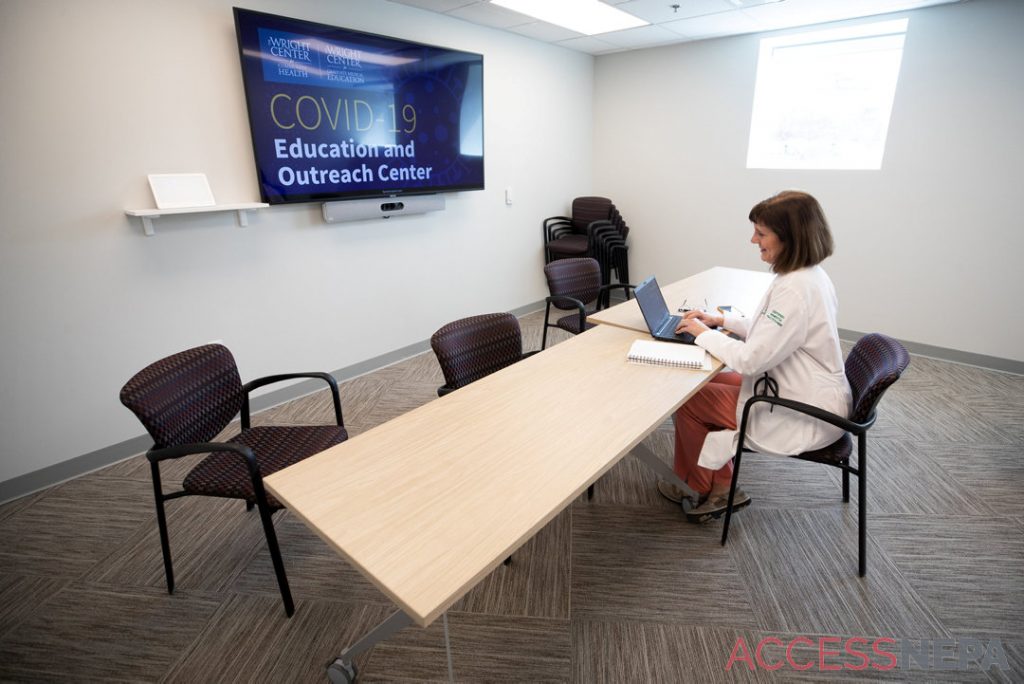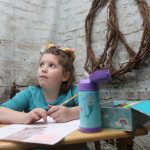Susan Scanland’s experience with older populations caught her interest from an early age and only increased as she got more experience in the medical field.
And after decades of clinical practice and teaching others from her own experience, Scanland, MSN, CRNP, GNP-BC, has become a leader in geriatric medicine.
“When I was growing up, I was surrounded by grandparents who lived to a ripe old age (and) elderly neighbors, you know, who I would just go visit and sit on their porch and enjoy conversation,” said Scanland, a Dunmore native who now lives in South Abington Twp. “So I had a very positive image of elders growing up.”
When Scanland was a 13-year-old candy-striper at the former Mercy Hospital in Scranton, she came across a terrified, frail, elderly man, “and my heart went out to him,” she recalled.
“I was just so curious as to why he was that way, so I think they were the initial seeds for my interest in geriatrics,” Scanland said.
After earning a bachelor’s degree in nursing from Wilkes University, Scanland worked as a registered nurse for a year before becoming part of University of Pittsburgh’s first class to receive master’s degrees to become nurse practitioners.
When she returned to Northeast Pennsylvania, she took a job at the Wilkes-Barre VA Medical Center.
“It was wonderful to serve our veterans and a great place to start as a new nurse practitioner,” Scanland said. “All the services we needed for our patients were under one roof, so referrals were easy.”
While Scanland enjoyed working with patients, she felt herself drawn to teach ing, too, and that balance is something she has maintained throughout her career. She moved on from the VA after five years and taught geriatrics at the Wyoming Valley Family Practice residency in Kingston, where she led a team of resident physicians, student nurse practitioners, medical students and pharmacy students doing nursing home rounds and house calls.
Scanland wanted to teach because she saw a need in the community, as “there were and still are so few specialists in geriatrics,” she explained.
“So many elders did not have access to the care they needed because of conditions like depression and dementia,” she said. “And I learned that was true nationally. My mission was to help other nurse practitioners, long-term care nurses and physicians … to provide the best care for these conditions.”
With the VA, Scanland gave seminars on geriatrics and nurses, and that launched a public speaking career that saw her earn the designation of certified speaking professional. Scanland started her own business, Dementia Connection, and gave 700 talks in 41 states on topics such as Alzheimer’s disease, dementia and depression in elderly people, all while continuing with her clinical practice, handling dementia assessments and working as a dementia consultant for several local nursing facilities.
Scanland took her latest career step in February, when she joined the Wright Center so she could “bring my expertise back home to my own community rather than speaking across the country and internationally.”
And as a Baby Boomer, Scanland now finds herself in the unique position of treating people from her own generation, which she finds exciting.
“I’ve seen this population shift coming for my whole career since 1982,” she said. “And I love the fact that more attention is being drawn to the frail elders in our country. It makes these issues even more important when you become what you’re an expert in when you become what you’ve been talking about. It relates more because I’m there.”
When COVID-19 arrived in NEPA not long after Scanland started her new job, she joined her coworkers in reaching out to regional health care facilities and offering them education and support. Scanland also participated in a house call program for seniors who physically couldn’t get into the office.
As a federally qualified health center, the Wright Center doesn’t turn away patients who can’t pay, Scanland said, so it helps elders who are not only medically vulnerable but also socially, behaviorally and financially vulnerable.
“They’re really challenged, and that’s what drew me to this practice,” Scanland said. “The Wright Center had this vision to really reach these elders who need special care.”
Part of Scanland’s job also involves the July 1 launch of the center’s Geriatric Service Line, which will help patients who have multiple chronic conditions and deal with the challenges of living on their own. A geriatrics fellowship educational tract, meanwhile, will teach new doctors and other health care care providers about how to care for that population.
“I will be able to teach these physicians what I practice here, including the Alzheimer’s and dementia care program. … And also I will be doing Medicare annual well visits, so I’ll be teaching and practicing together, which is what I’ve always done,” Scanland said.
The Geriatric Service Line also will include a UCLA Alzheimer’s and Dementia Care clinic offered in its Jermyn, Scranton and Clarks Summit offices. Patients will get a 90-minute consultative appointment every six months with patient and caregiver support between appointments.
“We will help local physicians, nurse practitioners and physician assistants to develop and implement a plan of dementia care,” Scanland said. “And so we’re going to be working directly with the patients’ primary care physicians.”

CHRISTOPHER DOLAN / STAFF PHOTOGRAPHER
Gerontological nurse practitioner Susan Scanland works alone in a classroom at the Wright Center in Scranton as part of its COVID-19 Education and Outreach Center in Scranton on Thursday, April 16, 2020. The Wright Center has joined with the Pennsylvania Department of Human Services and six hospital systems across the state to provide clinical care and guidance to assisted living facilities and personal care homes during the COVID-19 outbreak.
It all aims to help what Scanland called “a huge crisis” in Pennsylvania, where Alzheimer’s affects about 200,000 people over 65 and is the sixth-leading cause of death. In her new role, she looks forward to sharing her experience with others.
“I’ve always been contacted by friends and family for these issues, but now it’s great that they can send their family members to a place — to a practice setting — where i can help them,” Scanland said.
Scanland knows from experience the challenges families face, and particularly those supporting loved ones from a distance. Her late father-in-law had a type of dementia but lived in Baltimore, a situation Scanland said gave her “even more empathy and sensitivity to the difficult maze that caregivers walk.”
Scanland believes her efforts with this new program will help vulnerable older people who tend to get overlooked.
“There are what we call health care disparities where elders don’t get the attention that their chronic conditions deserve,” she said. “And because of their social isolation or lack of family support, they fall through the cracks of our health care system.”
While Scanland has accomplished much in her career, she look to her service on the the clinical practice guideline working group for the National Alzheimer’s Association as her greatest honor. She is one of 10 members on the national task force, where she has worked with leading experts in Alzheimer’s care from across the nation in developing an evidence-based research guideline on how to diagnose Alzheimer’s disease.
And at home, both of her sons have followed her example in different way: Craig went into health care (specifically podiatry like his father, Dr. John Scanland) and is a resident at Geisinger Community Medical Center in Scranton, while Brendan enjoys professional speaking and is pursuing a master’s degree at Syracuse University’s S.I. Newhouse School of Public Communications.
Looking at her past and present, though, Scanland sees a job she just loves to do.
“(I) have really enjoyed being combining the roles of nurse practitioner geriatric and dementia specialist and professional speaker,” she said. “It certainly has kept me from getting bored. It’s certainly kept me stimulated.”
Meet Susan Scanland
- At home: A Dunmore native, she lives in South Abington Twp. with her husband, Dr. John Scanland, a podiatrist. They have two sons, Dr. Craig Scanland and Brendan Scanland. She is the daughter of Elaine Cameli and the late George Cameli.
- At work: Geriatric nurse practitioner for the Wright Center for Community Health
- Inspirations: Her husband; her sons; her sisters, Sandy and Maine; and her girlfriends, many oh whom have been in her life for more than five decades (“They help keep my work/life balanced,” she said.); and her mother, “who leads a healthy, socially active lifestyle (and) is the best positive example for healthy aging.”
- Aspirations: To use the knowledge of nearly 40 years’ experience to grow a dementia program at the Wright Center and to be Lackawanna County’s trusted adviser for people and families dealing with Alzheimer’s and other dementias.
- Diversions: Traveling, working out, skiing and kayaking
- Aversions: Ageism, when others set limits on how someone is perceived or treated because of their chronological age in a youth-oriented society.
- Quotes: “Age is a state of mind” and “Don’t regret getting older, it is a privilege denied to many.”

Caitlin Heaney West is the content editor for Access NEPA and oversees the Early Access blog in addition to working as a copy editor and staff writer for The Times-Tribune. An award-winning journalist, she is a summa cum laude graduate of Shippensburg University and also earned a master’s degree from Marywood University. Caitlin joined the Times-Shamrock family in 2009 and lives in Scranton. Contact: cwest@timesshamrock.com; 570-348-9100 x5107; or @cheaneywest



